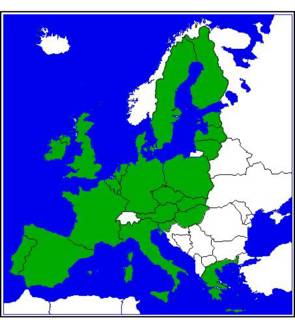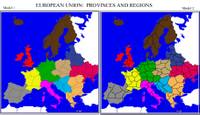變
The following is a thought experiment.
WORLD POWER BLOCS
Introduction
Definite Power Blocs
Potential Power Blocs
Buffer Zones
Projections
PART 1: THE HISTORICAL DEVELOPMENT OF SUPER-STATES
Throughout history, the social systems of mankind have consistently favored more complexity, specialization, and strength of numbers. Starting with ancient times, when larger tribes began to displace smaller wandering bands, and not long after that when semi-sedentary people and more densely populated farming cities began to gain a foothold. There is little doubt about the outcome when 1 strong tribal hunter-gatherer comes into competition for resources with 100 weak farmers.
In time, these social systems with their respective religions, languages, governments, education, training, and culture in general continued their march toward expansion, with the city states growing into small then large empires, nation states, and today, the introduction the super-state, places like the USA and old USSR. These are really in effect world power blocs, ultra-organized social systems that compete to control the world’s resources and trade through institutions and strength of might via their respective militaries.
DEFINITE POWER BLOCS
We can follow through on current trends to project who and were these world power blocs will be centered. There are a number that could or could not coalesce depending on events that are too difficult to predict, and some regions that could gravitate towards being dominated by one or another bloc. These are as follows.
North America
The United States is currently the strongest super-state on the planet. The institutions and military might developed and enhanced in the US contribute to a dominant role in controlling trade and policy on the globe. After the fall of the USSR, the USA pushed to expand its influence in areas like the Balkans, central and eastern Europe, central Asia, the middle east, etc. Within a century or 2, there could be political union between most of the major countries on the North American continent: primarily the USA, Canada, and Mexico. A dominant influence will certainly be extended into Caribbean and central America. There is an unlikely possibility that the South American bloc will not develop, extending the hegemony, or influence of the north into northern and possibly western South America as well.
Europe
The subcontinent of Europe, after many centuries of division or inter-competition, finally appears to be heading towards unification. Instead of conquest by a dominant ethnic nation, its form appears to be peaceful and diplomatic via the European Union. Monetary unification has already taken hold and the political cannot linger far behind. The EU is expanding eastward, and in time will no doubt encompass nearly the entirety of the subcontinent to the borders of Russia and Turkey.
Russia
Despite having lost an astonishing amount of power during the fall of the communist regime of the old soviet republics and subsequent breakup, Russia continues to possess a sense of purpose in world affairs. Even with a low population and birth rate, their technological and scientific prowess will help them harness the nearly inexhaustible resources of the vast Siberian wilderness, fueling what could be centuries of development.
China
Having successfully resisted being carved up by European, American, and Japanese powers over the last few hundred years, China already has the apparatus in place to ensure it will be a strong power bloc in the future. It maintains tight controls over its own evolution and directs its long term development towards gaining strength exponentially in years to come. As their economic, technological, and military might increases, their influence over world affairs will become more and more apparent.
India
The Indian subcontinent is in an early stage of development, with rampant poverty, disorganization, and as of yet, a certain lack of national unity that is necessary to become a power broker in world affairs. Despite this, they have a burgeoning population, nuclear weapons, and have invested heavily in technology. Though they will coalesce later than any of the powers listed above, India will undoubtedly become a power bloc within 200 years.
POTENTIAL POWER BLOCS
South America
Being led by the rapidly developing nation of Brazil, a power bloc is likely to form in South America. It may encompass the entirety of the continent or most of it, depending on interference and competition from the North American bloc. It has the apparatus in place to do this rather quickly, should the people there be convinced that it is in their best interest to put their differences aside and strive towards that common goal.
Islamic World
With its strict values and simple code of conduct, the Islamic Koran has become a culturally unifying force in every Muslim country. Despite this similar world view and common cultural ties, the countries in northern Africa, the middle-east, and central Asia consistently seem doomed to division. It is definitely possible that they could overcome the infighting and form a common super-state, but will have to double their efforts to resist the economically rooted colonial divisions perpetuated by the planets reliance on oil. There are a lot of forces at play to keep the region divided, so this may or may not evolve into a united power bloc.
Sub-Saharan Africa
The rapid formation of a nation state from a more primordial tribal organization is a colonial legacy that has both strengthened and simultaneously hampered Africa. Though it is a method of organization far superior by means of extending influence than the old systems, it has split ethnic regions along lines that have more to do with resource allocation. In our time, Africa is a place of ceaseless rebellion and warfare, far from a likely candidate to come together for a shared goal. Yet, should a dominant power begin to successfully swallow up neighboring states, we might have a candidate to forge the way towards becoming a power bloc. Such countries could be Nigeria or South Africa. Yet, this remains a remote possibility in the next 300 years, and the continent is likely to remain a place split between empires.
Indonesia and Australia
This region is the most unlikely candidate for cohesion into a world power bloc. Australia and New Zealand have the social systems, technology, and military might that could extend influence, but with such inconsequential birth rates, their influence will continue to decline in the coming decades. Indonesia is quite the opposite, with a swelling population with none of the social mechanisms in place to effectively extend its influence beyond its own waters. Should there be some type of synthesis between the two, there is an outside chance that this region could become a world power bloc, even encompassing a good parcel of south-east Asia as well.
BUFFER ZONES
Between each power bloc is territory that could end up being dominated by one or the other, depending on unfolding events. These are briefly described below.
Central Asia
The old soviet republics around Kazakhstan and the territory extending down to Pakistan could well prove to be a flashpoint for the super-states in the future. Previously under the Soviet umbrella, this region will certainly be vied for by the new Russian bloc, eager to reestablish its hegemony, a newly confident China, and India. If an Islamic empire forms, that will make 4 power brokers competing for this region.
Southeast Asia
This is most likely area of dispute between China and India. With the exception of Vietnam, this region is more culturally similar to India, and is thus more likely to end up part of their sphere of influence. Yet, with an ambitious China maturing earlier, they could certainly preempt the Indian overtures, and swallow up the region as well. Should the unlikely Indonesian/Australian power bloc grow past an embryonic state, they could also attempt to gain control (less they become an area to compete for themselves).
Saharan Desert
With scarce resources and very sparse population, there is little interest in the Sahara save potential for future agriculture or development. Unless both the Islamic and African power blocs consolidate their blocs, the Sahara will have little impact on world affairs.






